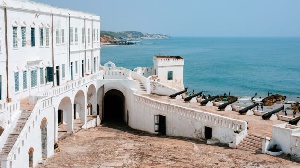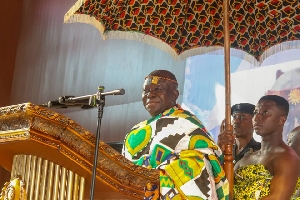- Home - News
- TWI News | TV
- Polls
- Year In Review
- News Archive
- Crime & Punishment
- Politics
- Regional
- Editorial
- Health
- Ghanaians Abroad
- Tabloid
- Africa
- Religion
- Election 2020
- Coronavirus
- News Videos | TV
- Photo Archives
- News Headlines
- Press Release
Opinions of Wednesday, 5 August 2020
Columnist: Bright Philip Donkor
The need to improve tourism when Covid-19 is over
The need to improve tourism in Ghana is very crucial to the socio-economic development of the country and requires a multi stakeholder approach on the part of government, managers of tourism facilities, tourism trade associations, non-governmental organizations and individuals. Ghana is an amazing treasure trove of diverse tourism resources such as sacred grooves, colonial graveyards and slave routes and should be harnessed so as to develop a high quality, internationally competitive and sustainable tourism industry.
Indeed, Ghana is a haven that combines the charms of a tropical beach idyll with a fascinating historical heritage, rich cultural variety, and some interesting wildlife in the national parks.
Ghana’s nascent tourism industry holds a lot of promises and it is poised to usher the country into the economic paradise that it has longed for. It is currently, the third largest foreign exchange earner, after minerals and cocoa.
The government in 1985 identified tourism as one of the key sectors for development under the Economic Recovery Programme (ERP) after it became clear that, the country could no longer depend on fluctuating world market prices for her raw materials. The tourist industry in Ghana is known to promote sustainable tourism which includes; cultural tourism, heritage tourism, recreational tourism, adventure tourism and events tourism.
In this article, I ask the question, has tourism been improved enough to our expectation? How can we "See Ghana, Wear Ghana and Eat Ghana and still believe that Ghanaians will buy into it and let us travel to see and fall in love with our country as we live the new normal? Therefore, in our attempt to develop the country’s tourism potential and products, there is the need to direct attention to key areas such as heritage, culture, beaches, conventions, accommodation, transport and communications.
To begin with, the natural, environmental and historical heritage sites should be well preserved for domestic as well as international tourists. The natural environmental heritage can be seen in the areas of lakes, rivers, waterfalls, forest reserves, national parks,wildlife, bird sanctuaries, caves and rock formations. This can be made possible by avoiding the indiscriminate cutting down of trees along river banks, the use of dynamites and other explosive devices to break down rocks. We also need to put a stop to the illegal poaching of animals. These activities are inimical to the loss of plant and animal life, disappearance of the ecosystem and destruction of hectares of tropical forest. The destruction of the environment and adverse climate change could be resultant effect. .
The creation of forest walks, treetop canopy walkways should be prioritized to provide opportunity for tourists to see and experience much of our indigenous plant life, as well as rare butterflies, birds and game. All these measures are bound to propel the country’s efforts in tourism to greater heights.
The historical heritage includes Kente weaving, Adinkra cloth making, pottery, wood carving, Gold silver –smithing as well as shrines. The Ghana Tourist Board (GTB) in collaboration with other stakeholders and community support groups should erect monumental structures around such sites to safeguard and preserve some of the tools and implements used in making some of the products. The museums should also see major improvements and given facelift for them to offer interesting artifacts and interpretation to both domestic and international tourists.
The culture of the people should also be well portrayed and diversified. By this, tourists should be given warm reception and hospitality. In tourism, a smile or infectious greeting is worth its volume in gold. This is the key to winning tourists and convincing them to project our fame abroad.
Additionally, there is the need to expose the traditions and cultures of various tribes or ethnic groups in the country for better understanding and to promote national cohesion. This should be seen in the areas of descent language, the food we eat, our mode of dressing depicting the typical Ghanaian, the celebration of festivals and funerals.
A very congenial atmosphere should also be created for tourists to experience some of our indigenous Ghanaian dishes, regalia and paraphernalia.
Our beaches or coastlines are interesting spots where most tourists visit to have fun and relaxation. A number of them enjoy the serenity of the coasts and its breeze. They are famous for their ancient forts and castles built by the European traders.
Good environment practices should be maintained such as avoiding indiscriminate defecating along the beaches, illegal sand-winning activities, disposal of waste substances and materials into the sea and water bodies that threatens the lives of marine and aquatic species. This will provide the opportunity for tourists to go on castle tours, including visits to slave dungeons.
Another area of significance where tourism can be developed in Ghana has to do with the conventions. Most famous of the regular international events hosted in Ghana is PANAFEST (Pan African Historical Theatre Festival) the terminal cultural event dedicated to the enhancement of the ideals of Pan Africanism and development of African continent. Since its inception, PANFEST has brought together Africans and people of African descent as well as persons committed to the well-being of Africans on the continent and in the diaspora. This provides the opportunity for Ghanaians and people of African roots to share ideas, experiences and in areas that will inure to their benefits.
Ghana, according to CNN, is now the next big tourist destination. This is mainly because of the ‘year of return’ initiative. The country unveiled a 15-year-long tourism plan that seeks to increase the annual number of tourists to Ghana from one million to eight million per year by 2027. Ghana’s travel industry is projected to raise $8.3 billion a year by 2027, plus associated benefits, according to the plan.
Apart from this, exhibitions and trade fairs can be organized. These fairs can help the government of Ghana to increase exports by exploring new markets where she can get more value for her non-traditional exports and avert fluctuations in her export earnings. Through the Ghana Export Promotion, trade fairs like GIFEX, INDUTECH, Inter-Tourism can be organized to showcase some of the products by adding value to them. It will also bring manufacturers and consumers together. Thus, they also create avenues for opening new markets and getting new customers as well as introducing new technologies.
Such international fairs enable local industrialists to capture more markets abroad so as to increase their exports. Trade fairs also encourage competition among industries to make them produce better quality goods for export. As a result, tourism can be a prime industry contributing to the build-up of national revenue. If other handicraft producers portrayed their cultures and traditions creatively in their crafts and improved their quality, packaging and marketing, they could also take advantage of tourists’ inflow and increase the patronage of the handicraft trade.
Accommodation is also very important in our quest to develop the tourism sector, since efforts in it will, make tourism the number one contributor to the country’s Gross Domestic Product (GDP).
Private sector businesses like hotels, restaurants, travel and tour agencies, car hire services, retail shops, banks and taxis that deal directly with tourists should render patient-oriented services. These hospitality facilities should have a service culture and customer service orientation. A service culture which places the customer ahead of the business or its workers.
Additionally, good customer service attributes like reliability, justice, promptness, assurance and empathy will go a long way to re-assert Ghana as a preferred vacation, conference and investment destination in the sub-region.
Lastly, transport and communication should be given the needed attention. The road network should be improved with the various signage and good buses. This will ensure the comfort and safety of tourists to places where they want to seek pleasure. Communication systems should also meet internationally acceptable standards to enable tourists to reach out to service providers for vital information and direction.
In conclusion, if pragmatic measures are put in place with collaborative efforts from development partners and other stakeholders, it will result in a phenomenal growth in the tourism industry. The sector will also stand a better chance of registering significant annual growth rate.
Its impacts at both local and international levels will be outstanding in economic terms and culturally with our abounding, splendid cultural traditions reverberating through all corners of the world. The sector will also become a dynamic socio-economic index in the transformation of the Ghanaian economy and become a cynosure of all eyes throughout the world.
I know for a fact that, as I put down this piece Covid-19 continues to wreck havoc on the tourism sector. Whilst there isn't going to be more incoming international travel during this period, we don't anticipate any significant improvement in the end of this year either so, for this year we can join forces to improve domestic tourism. But then, I hope that when everything returns to normalcy, we will take deep breath, drink some water, wash our hands, eat an expansive food of thought & restrategize our digestion on the essence of improving tourism.











